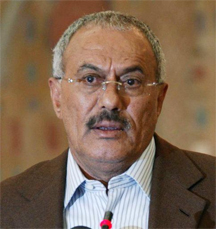SANAA, (Reuters) – Yemen’s veteran president Ali Abdullah Saleh has struck a defiant tone in an interview, a day after his government said he had accepted a Gulf Arab plan to hand over power within weeks.
Saleh has faced down three months of street protests as well as pressure to go from his main backers Saudi Arabia and the United States, and opposition groups fear his verbal acceptance of the plan may be no more than a tactic.
“We are going to stick to constitutional legitimacy. We won’t accept ‘constructive chaos’,” he told BBC Arabic television yesterday, using language that some fear means he intends to see out his presidential term to September 2013.
“Who should I hand power over to? Insurrectionists?”

Saleh has ruled in Yemen for nearly 33 years, overseeing the unification of North and South Yemen in 1990. Growing popular discontent with endemic poverty, corruption and lack of opportunity has been galvanised into mass protest by the success of revolutions in Tunisia and Egypt. Scores of demonstrators have been killed in the unrest.
Protesters demanding Saleh’s immediate resignation vowed on Sunday to step up street protests and voiced suspicions that his inner circle could frustrate the Gulf proposal, which calls for him to step down within a month of signing the plan together with the opposition.
No announcement has been made as to when and how the agreement would be formalised. The main opposition coalition welcomed the plan but stopped short of a full endorsement, saying it was still negotiating with Gulf and U.S. mediators over its role in a transition government.
The youths and activists who provided the momentum for the anti-Saleh protests are sceptical. They do not trust Saleh, and worry that the ruling party and the opposition, which served in parliament before the protests, will ignore the wishes of the tens of thousands in the streets demanding democratic reforms.




